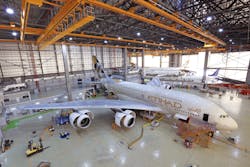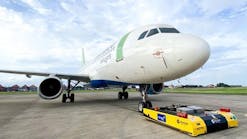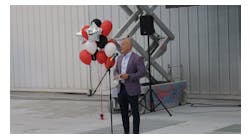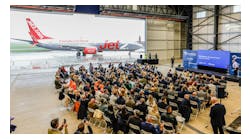What are Middle East companies saying about business in their region?
A Feb. 11, 2019 Boeing press release read: “Boeing Forecasts Middle East Aviation Services Market at $745 Billion.” It went on to describe the Boeing perspective of services in the Middle East with comments like, “demand for commercial aircraft in the Middle East expected to more than triple in 20 years” and, “the growing fleet requires aviation services, including supply chain support (parts and parts logistics), maintenance and engineering services, and aircraft modification.” This was just one of many news items from a number of maintenance and services organizations during the February MRO Middle East tradeshow.
As this tradeshow continued, a steady stream of aviation maintenance related news items appeared in my inbox. Some of the headlines read; “Etihad Airways Engineering and Tarmac Aerosave Partner to Expand MRO Services Globally,” “Lufthansa Technik Middle East Continues on Growth Path,” Falcon Aviation Highlights Saudi GACA Authorization for Aircraft Maintenance,” and “Satair and Joramco Sign Contract at MRO Middle East.”
I have spent a fair amount of time visiting and working at various airline maintenance organizations and MROs around the world, but not many located in the Middle East region. I thought I’d take a closer look and contacted a few companies with facilities in the United Arab Emirates or UAE. One thing for sure, it appears like aviation is thriving in the region with a large MRO presence.
Etihad Airways Engineering
Etihad Airways Engineering, which is part of the Etihad Aviation Group, is a large commercial aircraft MRO services provider in the Middle East. Located at the Abu Dhabi International Airport, it offers aircraft maintenance and engineering solutions, including airframe maintenance, component repair, overhaul services, and technical training. Etihad Airways Engineering employs more than 2,000 professionals from around the world.
Etihad Airways Engineering include services for the Etihad Airways fleet, as well as many other MRO customers including some of the world’s leading airlines, OEMs, and aviation businesses from South America, Europe, Middle East, Asia, and Australia.
Lufthansa Technik Middle East
Lufthansa Technik’s new subsidiary, Lufthansa Technik Middle East (LTME) is located at the Aviation District at Dubai South. LTME has already doubled its workshop space in 2018 one year after its inauguration. The subsidiary currently focuses on composite repairs and engine-related work. LTME has a partnership with DC Aviation at the same location, through which they perform aircraft maintenance up to A-checks. AOG parts support including logistics, Cyclean engine wash services, and a local material support desk are also part of LTMEM offerings.
Richard Haas, senior director corporate sales, Africa & Middle East at Lufthansa Technik, comments: “We primarily serve airlines located in the Middle East and its surrounding regions. It is worth noting that one-third of the world´s population lives within four flight hours from Dubai. Thus, the reachable market potential is very large and extends well beyond the Middle East itself.”
AAR Corp.
AAR’s presence in the Middle East consists of a large warehouse in Dubai to support supply chain needs in the region for both commercial and defense customers. This includes staffing for 24/7 AOG support worldwide. Rahul Shah, SVP strategic growth and business development, says: “On the defense side of the business we support the region’s defense aircraft by providing performance base logistics support making sure the guarantee in mission capability and aircraft availability by providing the materials available at right time. Closed loop repair management of the components is the way to go for the defense customers.” Shah continues: “We also provide depot level maintenance setup in country whereby countries can be self-sufficient in performing the high cost driver component in their facilities allowing them to have their own capable trained technicians to work on the maintenance of the components in their own backyard. We have done such efforts in Egypt and UAE.”
Business Today, Challenges, and Company Attributes
AAR’s Shah characterizes business today by saying business is getting very competitive in the Middle East region and feels this is attributed to OEM entrance into the aftermarket. He says: “The supply chain business has seen an increase in competition. However, we feel there is business for everyone, and as long as competition is healthy it is good for airline customers.”
Shah feels that more emphasis and use of digitization and systems like aircraft health management (AHM) would offer airlines the potential for efficiency that is only just being understood. Suppliers need to create the right partnerships and value propositions in order for all to benefit from “big data.”
LTME feels the business potential for Maintenance, Repair and Overhaul in the Middle East is very large, quite dynamic, and diversified. He also feels, as consequence, there is a lot of competition. Haas comments: “The general challenges of our industry are, of course, mostly valid also for the Middle East. Even in this region, we notice that our customers give further cost reductions a high priority. Thus, I believe that with our local footprint we are positioned to keep fueling our growth path in this region.”
Etihad Airways Engineering commented as part of an airline group, it thinks like an airline, and therefore has a deep understanding of it's airline customers’ needs. It also feels that as the OEMs increasingly seek to claim a share of the MRO aftermarket and access to new aircraft types becomes constricted, remaining focused on the needs of the customer and ensuring that their operation is supported is imperative. It understands this challenge and has leveraged its position to work in collaboration with a number of the largest OEMs to provide support for the operator as next generation aircraft types are introduced, while ensuring that its legacy fleet utilization is maximized through predictive maintenance and cabin upgrade programs.
When asked what attributes an MRO located in the Middle East region should have, I received differing yet interesting answers.
Etihad Airways Engineering feels it’s their location and commented it is a global MRO, that just happens to be centrally based in the Middle East. Its geographical location is ideal for supporting airlines from a variety of regions, as well as having all of the necessary capabilities to support leasing companies as its transition assets into different fleets across the globe.
AAR’s Shah says: “Strategic vision, investing in future technology of advance airframe and engines, providing digital efficiency with high visibility of assets, and providing innovative solutions in supply chain.” He goes on to say, “Agility in an industry that is under constant pressure to find efficiencies, ability to meet ever changing needs, and a hunger to succeed.”
LTME’s Haas says, “In my opinion, focusing on the specific needs (i.e., hot and sandy conditions, increased local footprint) of the Middle Eastern region will be the key to success. Hence, we listen closely to our customers in the Middle East in order to continue our joint success story here.”
Workforce Challenges
LTME’s Hass says of the Middle East workforce: “For decades, the Middle East always relied on skilled labor from outside of its respective countries, so it has a lot of experience in attracting talents from other parts of the world. But, as skilled mechanics become more and more a limited resource worldwide, I can imagine the recruitment situation to become a growing concern in this region as well.”
Etihad Airways Engineering summed up the workforce challenges like this: The shortage of engineering talent within aviation is a global issue. It is essential that MROs invest in their staff and encourage the next generation of maintenance professionals, to ensure the continuity of its business. It has a Part 147 training facility at its base in Abu Dhabi, with 161 currently enrolled in the engineering graduate program. It proudly notes that 54 of these were female, which indicates its support of ‘Women in Aviation’ initiatives is showing results. From the previous program, 28 students have their basic licenses and are working on different aircraft types. Etihad Airways Engineering collaborates with five universities and colleges within the UAE to ensure the program and career streams are supported.
AAR feels one of the challenges of setting up MROs in the Middle East region is attracting the right type of skilled labor and then retaining it. It also stated this challenge is worldwide.
Shah says: “A major problem is going to be finding a source of highly skilled maintenance personnel. Many experienced mechanics are at their retirement age, with a shortfall of workers to replace them, and there’s a lot of competition for personnel with the right skills."
One of the ways of doing so is through making proper awareness of the skills required and a career path the MRO industry can provide through education. This does not necessarily mean opening more campuses or colleges, but ensuring that students get the right type of courses that gear them up to tackle the needs and challenges in the industry.
Growing competition, OEMs entering the aftermarket and services segment, recruitment and retention, workforce skills and talent challenges, more digitalization in maintenance processes – this sounds like a conversation that could take place any where.




